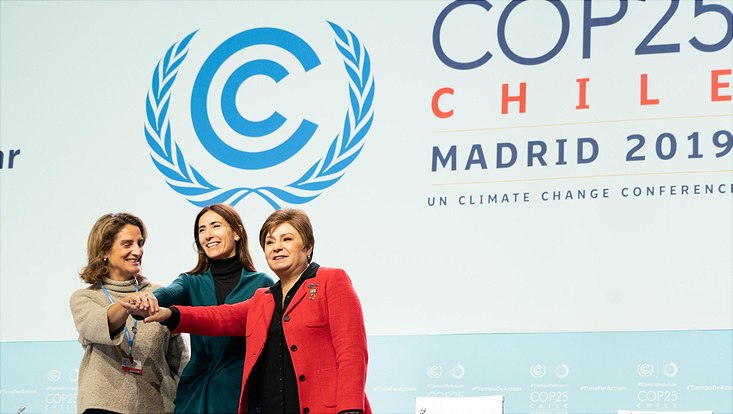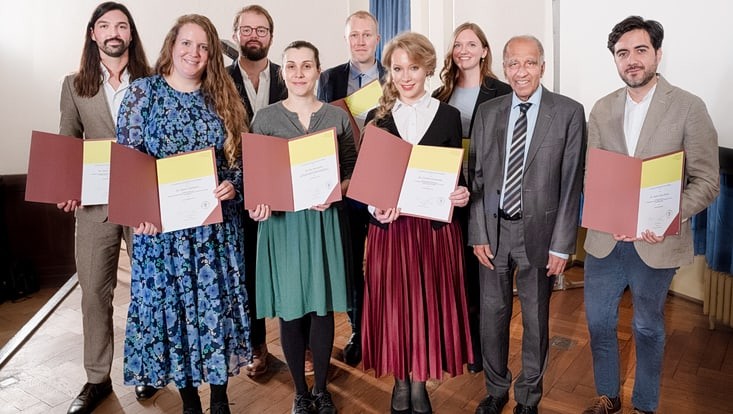and Society (CLICCS)
When Climate Protection is Conjured Up
14 January 2021, by Stephanie Janssen

Photo: UNFCCC
In recent years the nature of UN Climate Change Conferences has changed. While in the past the annual negotiations were largely bureaucratic, today they are dominated by a quest for solutions and a narrative that conjures up positive progress in the context of climate protection. CLICCS researcher Stefan Aykut has dubbed this phenomenon “incantatory governance,” and identifies in it characteristics of modern management culture. But does it help us achieve climate goals?
Since 2015, the year of the Paris Climate Change Conference, something has changed. In the Paris Agreement, the follow-up agreement to the Kyoto Protocol, binding regulations regarding CO2 emissions were abandoned, and for the first time only an ultimate goal was set: together, the participating countries agreed to limit global warming to below two degrees Celsius, or better still 1.5 degrees. How they were supposed to achieve this was left up to them. The countries only committed to regularly submit national climate plans and report on their implementation.
The conference met with a wave of approval. Participants, the media and organizations were virtually unanimous in praising the United Nations World Climate Change Conference as a breakthrough. The agreed-upon two-degree goal was presented in a positive light. There were, of course, still points of criticism, such as the lack of concrete commitments to reduce greenhouse gases and the small compensation payments for countries that had few emissions to date. But these concerns hardly penetrated the collective consciousness.
Positive narrative as important as the actual outcome
According to Prof. Dr. Stefan Aykut, this is no coincidence. A sociologist at Universität Hamburg’s Cluster of Excellence CLICCS, he has been investigating climate conferences since 2007, analyzing the topics, negotiations and procedures and interviewing participants.
“Even in the run-up to the Paris conference, it was clear that the USA and China would not agree to legally binding CO2 goals. Nevertheless, it was imperative that the conference not fail – or be seen as a failure,” explains Aykut. Like the Copenhagen conference in 2009, which is generally remembered as a failure, causing global disillusionment. As a result, companies e.g. abandoned a series of planned climate protection programs, since global politics didn’t seem prepared to implement climate protection.
Aykut describes how, as a result, think tanks and organizations realized that a positive narrative is at least as important as the actual outcome of the negotiations. On many levels, it can have a direct effect on whether or not climate protection measures are taken. According to Aykut, this aspect was clearly recognized prior to the 2015 conference, and consequently the positive dynamic was supported and propagated by a number of organizations – or “conjured up,” so to speak.
Modern management techniques do have disadvantages
“Using motivation and positive narratives to achieve an effect is part of modern management culture. It can act as a self-reinforcing process,” explains the sociologist. “If governments and international organizations increasingly employ these techniques, however, there are disadvantages.” Currently more and more companies are announcing their own climate goals, such as climate-neutral operations by 2050. Aykut cites the “Race to Zero” initiated by the United Nations as an example. Here, more than 1,000 companies, including Amazon, Apple, Mercedes and Ikea, have committed themselves to ambitious goals.
“Initially, that sounds great and improves their image. But 2050 is a long way off,” the sociologist says. “How can we tell the difference between greenwashing and genuine commitment? What achieving ‘net zero emissions’ actually means is often unclear.” When everyone is talking about climate protection, there is a risk of the situation being assessed too positively. And while long-term goals can have a motivating effect, they can also distract from the short-term changes needed. But the dramatic changes that are now required cannot be put off. What is needed is a genuine transformation of society.
Publication:
Aykut, S. C., Morena, E., Foyer, J. (2020): ‘Incantatory’ governance: global climate politics’ performative turn and its wider significance for global politics, International Politics, 1-22


